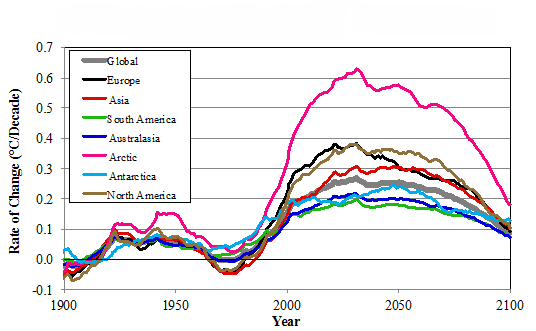Climate Change Could Push Global Warming Rate To 1,000-Year High: Study

Earth is right on the cusp of a new period where the rate of rise in global temperatures could reach a level not seen in the last 1,000 years, according to a new study published in the journal Nature Climate Change. Although this accelerated rise would affect all countries, the Arctic region, which is already losing ice at a steady rate, is likely to be the worst-hit.
The study, carried out by scientists from the U.S. Department of Energy’s Pacific Northwest National Laboratory, found that by 2020, the rate at which temperatures are rising globally could cross 0.45 degrees Fahrenheit per decade -- eclipsing the historical bounds of the past 1,000 years. Moreover, if the emission of greenhouse house gases continues unabated, the rate of warming could reach 0.7 degrees Fahrenheit per decade.
“Essentially, the world is entering a new regime where what is normal is going to continue to change and it’s changing at a rate that natural processes might not be able to keep up with,” Steven Smith, the lead author of the paper, reportedly said. “We need to better understand what the effects of this will be and how to prepare for them.”

In order to examine the rates of temperature change, the researchers started off by calculating how quickly temperatures changed between 1850 and 1930, when the concentration of greenhouse gases in the atmosphere was low. This was then compared with temperature data for the past 2,000 years, obtained by studying natural sources like tree rings, corals and ice cores, in order to test the reliability of the model used by the researchers.
Using this model, the scientists calculated the rates of change between 1971 and 2020, and found that not only are most places around the world completely outside their natural temperature range, regional rates of change in Europe, North America and the Arctic are much higher than the global average.
The Arctic, which is already the fastest warming part of Earth and is experiencing accelerated thinning and shrinking of its ice cover, will see temperatures rise by 1.1 degrees Fahrenheit per decade by 2040, according to the study.
“The authors have demonstrated that we are currently headed into uncharted waters when it comes to the rate of climate change we are now seeing,” Michael Mann, a professor of meteorology at the Pennsylvania State University, told Climate Central.
© Copyright IBTimes 2024. All rights reserved.






















